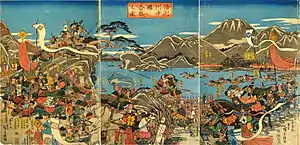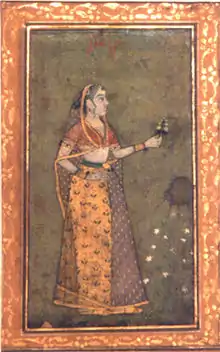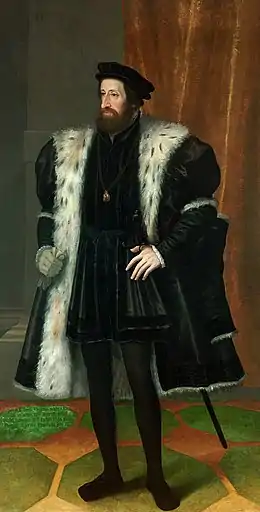1564
Year 1564 (MDLXIV) was a leap year starting on Saturday (link will display the full calendar) of the Julian calendar.
| Millennium: | 2nd millennium |
|---|---|
| Centuries: | |
| Decades: | |
| Years: |
| 1564 by topic |
|---|
| Arts and science |
| Leaders |
|
| Birth and death categories |
| Births – Deaths |
| Establishments and disestablishments categories |
| Establishments – Disestablishments |
| Works category |
|
| Gregorian calendar | 1564 MDLXIV |
| Ab urbe condita | 2317 |
| Armenian calendar | 1013 ԹՎ ՌԺԳ |
| Assyrian calendar | 6314 |
| Balinese saka calendar | 1485–1486 |
| Bengali calendar | 971 |
| Berber calendar | 2514 |
| English Regnal year | 6 Eliz. 1 – 7 Eliz. 1 |
| Buddhist calendar | 2108 |
| Burmese calendar | 926 |
| Byzantine calendar | 7072–7073 |
| Chinese calendar | 癸亥年 (Water Pig) 4260 or 4200 — to — 甲子年 (Wood Rat) 4261 or 4201 |
| Coptic calendar | 1280–1281 |
| Discordian calendar | 2730 |
| Ethiopian calendar | 1556–1557 |
| Hebrew calendar | 5324–5325 |
| Hindu calendars | |
| - Vikram Samvat | 1620–1621 |
| - Shaka Samvat | 1485–1486 |
| - Kali Yuga | 4664–4665 |
| Holocene calendar | 11564 |
| Igbo calendar | 564–565 |
| Iranian calendar | 942–943 |
| Islamic calendar | 971–972 |
| Japanese calendar | Eiroku 7 (永禄7年) |
| Javanese calendar | 1483–1484 |
| Julian calendar | 1564 MDLXIV |
| Korean calendar | 3897 |
| Minguo calendar | 348 before ROC 民前348年 |
| Nanakshahi calendar | 96 |
| Thai solar calendar | 2106–2107 |
| Tibetan calendar | 阴水猪年 (female Water-Pig) 1690 or 1309 or 537 — to — 阳木鼠年 (male Wood-Rat) 1691 or 1310 or 538 |
Events
January–June
- January 26 – Livonian War – Battle of Ula: A Lithuanian surprise attack results in a decisive defeat of the numerically superior Russian forces.[1]
- March 25 – Battle of Angol in Chile: Spanish Conquistador Lorenzo Bernal del Mercado defeats and kills the toqui Illangulién.
- June 22 – French settlers abandon Charlesfort, the first French attempt at colonizing what is now the United States, and establish Fort Caroline in Florida.
July–December
- July – English merchant Anthony Jenkinson returns to London from his second expedition to the Grand Duchy of Moscow, having gained a considerable extension of trading rights for the English Muscovy Company.
- September 4 – The Ronneby Bloodbath takes place in Ronneby, Denmark (now in Sweden).
- September 10 – Battle of Kawanakajima in Japan: Takeda Shingen fights the forces of Uesugi Kenshin for the final time, to a draw.
- November 21 – Spanish Conquistador Miguel López de Legazpi sails from Mexico. Later, he will conquer the Philippine Islands, founding Manila.
Date unknown
- First recorded report of a 'rat king'.[2]
- approx. date – Idris Alooma starts to rule the Kanem-Bornu Empire.
- The first Scottish Psalter is published.
Births
- January 1 – Šurhaci, Chinese prince (d. 1611)
- February 15 – Galileo Galilei, Italian astronomer and physicist (d. 1642)[3]
- February 26 (baptized) – Christopher Marlowe, English dramatist and poet (d. 1593)[4]
- March 7 – Pierre Coton, French Jesuit and royal confessor (d. 1626)
- March 9 – David Fabricius, Frisian astronomer (d. 1617)[5]
- March 15 – William Augustus, Duke of Brunswick-Harburg (d. 1642)
- March 20 – Thomas Morton, English bishop (d. 1659)
- April 2 – William Bathe, Irish Jesuit priest (d. 1614)
- April 26 (baptized) – William Shakespeare, English dramatist and poet (d. 1616)[6]
- April 27 – Henry Percy, 9th Earl of Northumberland (d. 1632)
- April 30 – Francis Hay, 9th Earl of Erroll, Scottish noble (d. 1631)
- May 27 – Margherita Gonzaga, Duchess of Ferrara, Italian noble, patron of the arts (d. 1618)
- June 11 – Joseph Heintz the Elder, Swiss artist (d. 1609)
- June 12 – John Casimir, Duke of Saxe-Coburg (d. 1633)
- June 28 – Cort Aslakssøn, Norwegian astronomer (d. 1624)
- July 6 – Johanna Sibylla of Hanau-Lichtenberg, Countess consort of Wied-Runkel and Isenburg (d. 1636)
- August 18 – Federico Borromeo, Cardinal Archbishop of Milan (d. 1631)
- August 24 – Patrick Forbes, bishop in the Church of Scotland (d. 1635)
- September 13 – Vincenzo Giustiniani, Italian banker and art collector (d. 1637)
- September 24 – William Adams, English navigator and samurai (d. 1620)[7]
- September 25 – Magnus Brahe, Swedish noble (d. 1633)
- September 28 – Sibylla of Anhalt, Duchess consort of Württemberg (1593-1608). (d. 1614)
- October 15 – Henry Julius, Duke of Brunswick-Lüneburg (1589-1613) (d. 1613)
- October 26 – Hans Leo Hassler, German composer and organist (d. 1612)
- November 3 (baptized) – Francisco Pacheco, Spanish artist (d. 1644)
- November 11 – Martinus Smiglecius, Polish philosopher (d. 1618)
- November 22 – Henry Brooke, 11th Baron Cobham, English peer and traitor (d. 1618)
- November 24 – Joseph Gaultier de la Vallette, French astronomer (d. 1647)
- December 25
- Johannes Buxtorf, German Calvinist theologian (d. 1629)
- Nicolaus Mulerius, Dutch astronomer and medical academic (d. 1630)
- December 31 – Ernest II, Duke of Brunswick-Lüneburg, German ruler (d. 1611)
- approximate date – Xue Susu, Chinese artist
- date unknown
- Pieter Brueghel the Younger, Flemish painter (d. 1638)
- Daniel Chamier, French minister of religion (d. 1621)
- Kryštof Harant z Polžic a Bezdružic, Bohemian composer and Protestant rebel (d. 1621)
- Pedro Páez, Spanish Jesuit missionary to Ethiopia (d. 1622)
- Thomas Shirley, English privateer (d. c.1634)
- probable
- Henry Chettle, English dramatist (d. 1607)
Deaths
- January 9 – Margaret Howard, Duchess of Norfolk (b. 1540)
- February 18 – Michelangelo, Italian artist, architect and sculptor (b. 1475)[8]
- February 19 – Guillaume Morel, French classical scholar (b. 1505)
- March 27 – Lütfi Pasha, Albanian-born Ottoman statesman, juridical scholar and poet of slave origin (b. c.1488)
- April – Pierre Belon, French naturalist (b. 1517)
- April 9 – Georg Hartmann, German instrument maker (b. 1489)
- May 2 – Cardinal Rodolfo Pio da Carpi, Italian humanist (b. 1500)
- May 27 – John Calvin, French Protestant reformer (b. 1509)[9]
- June 24 – Rani Durgavati, Indian queen (b. 1524)
- July 23 – Eléanor de Roucy de Roye, French noble (b. 1535)
- July 25 – Ferdinand I, Holy Roman Emperor (b. 1503)[10]
- July 31 – Luís de Velasco, Viceroy of New Spain (b. 1511)
- August 10 – Miyoshi Nagayoshi, Japanese samurai and daimyō (b. 1522)
- August 30 – Duchess Sabina of Bavaria (b. 1492)
- October 5 – Pierre de Manchicourt, Flemish composer
- October 6 – Guido Ascanio Sforza di Santa Fiora, Italian Catholic cardinal (b. 1518)
- October 15 – Andreas Vesalius, Flemish anatomist (b. 1514)[11]
- October 18 – Johannes Acronius Frisius, German physician and mathematician (b. 1520)
- December 6 – Ambrosius Blarer, influential German reformer in southern Germany and north-eastern Switzerland (b. 1492)
- date unknown
- Isabella Losa, Spanish scholar (b. 1491)
- Giovanni da Udine, Italian painter (b. 1487)
- Purandara Dasa, Indian musician (b. 1484)
- Argula von Grumbach, German Protestant reformer (b. 1490)
- Charles Estienne, French anatomist (b. 1503)
- Isabella de Luna, Spanish-Italian courtesan
- Manus O'Donnell, Irish leader
- probable – Maurice Scève, French poet (b. 1500)
References
- Giedre Mickunaite (January 1, 2006). Making a Great Ruler: Grand Duke Vytautas of Lithuania. Central European University Press. p. 172. ISBN 978-963-7326-58-5.
- Hart, Martin (1982) [c. 1973]. Rats. Allison & Busby. p. 66. ISBN 0-85031-297-3.
- Rom Harré (1983). Great Scientific Experiments: Twenty Experiments that Changed Our View of the World. Oxford University Press. p. 68. ISBN 978-0-19-286036-1.
- Avraham Oz (January 1, 1982). Marlowe. Doctor Faustus (...). Macmillan International Higher Education. p. 221. ISBN 978-1-137-07982-4.
- John Robert Christianson (2003). On Tycho's Island: Tycho Brahe, Science, and Culture in the Sixteenth Century. Cambridge University Press. p. 264. ISBN 978-0-521-00884-6.
- Samuel Schoenbaum; Distinguished Professor of Renaissance Literature and Director Center for Renaissance and Baroque Studies S Schoenbaum (1987). William Shakespeare: A Compact Documentary Life. Oxford University Press. p. 24. ISBN 978-0-19-505161-2.
- The Herald of Asia: A Review of Life and Progress in the Orient. 1916. p. 88.
- Linda Murray (1980). Michelangelo. Oxford University Press. p. 7. ISBN 978-0-19-520163-5.
- Thomas F. Torrance (December 19, 1996). Theology in Reconstruction. Wipf and Stock Publishers. p. 76. ISBN 978-1-72520-786-8.
- "Ferdinand I | Holy Roman emperor". Encyclopedia Britannica. Retrieved June 30, 2020.
- John M S Pearce (April 24, 2003). Fragments Of Neurological History. World Scientific. p. 7. ISBN 978-1-78326-110-9.
This article is issued from Wikipedia. The text is licensed under Creative Commons - Attribution - Sharealike. Additional terms may apply for the media files.



.jpg.webp)
%252C_by_anonymous_-_Museum_Catharijneconvent.jpg.webp)



